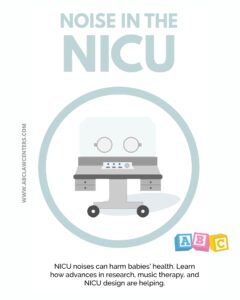The Neonatal Intensive Care Unit (NICU) is essential to the survival of many premature and sick infants. However, beeping monitors, ventilators, and alarms can make it difficult for NICU babies to sleep. The layout of a NICU can also influence noise level. The open-bay model, in which multiple infants are kept in one room, has more auditory disruptions than the single bay model, in which babies are housed in their own private rooms.
In addition to minimizing negative auditory stimuli through redesigning NICU layouts, hospitals can help their newborn patients by introducing initiatives to improve exposure to positive auditory stimuli. Here, we will discuss therapeutic use of sounds and music in the NICU, and how this can improve babies’ health.
Music Therapy for NICU Babies
Research has shown that NICU babies who listen to music sleep better, gain more weight, and recover more easily from painful procedures. In particular, they may benefit from listening to familiar tunes and sounds; specifically, their parents’ voices. As Joanne Loewy and colleagues explain in a paper published by Pediatrics, “Vocal familiarity within the infant’s sound environment may provide an essential domain of consistency, security, and comfort that even the most modern NICUs cannot replicate.”
Moreover, there is a difference between live and recorded music. By instinct, infants entrain to the sounds of breathing for their own respiratory regulation. The ability to do so is especially important in premature infants, who often have underdeveloped lungs. The NICU environment makes self regulation difficult because of all the background noise.
How can parents engage with their NICU baby?
To combine the benefits of respiratory entrainment with the relaxing effects of music, parents can sing and breathe in a manner that reflects their infants’ vital rhythms. Loewy et al. conducted a randomized clinical trial with premature infants who had respiratory distress syndrome, sepsis, and/or were small for gestational age. Qualified music therapists worked with parents on supporting their babies’ health and development through live song. Parents were encouraged to pick a lullaby of their choosing. It was suggested that it could be one important to their cultural heritage or family history. If they did not have a preferred song, “Twinkle Twinkle Little Star” was used.
In the Loewy et al. study, music therapists also played the premature infants sounds to mimic the intrauterine environment. This included the Remo ocean disc, which has a “woosh”-like sound similar to the movement of fluid in the womb, and a gato box, which is a small instrument used to simulate the sound of a mother’s heart beat.
Loewy et al. found that the live lullabies sung by parents, as well as the instruments used to mimic sounds within the womb, improved cardiac and respiratory function. They also observed benefits related to feeding and sucking behaviors and quiet-alert states. Moreover, the parent-preferred lullabies enhanced bonding and decreased the stress felt by parents. This is important, because parents’ mental health often suffers while caring for babies in the NICU. In some cases, NICU parents even experience post-traumatic stress disorder (PTSD) for years after bringing a baby home.
Tell us your story.
Dealing with a birth injury diagnosis can be difficult, but our attorneys can help. The ABC Law Centers: Birth Injury Lawyers team focuses exclusively on birth injury and are dedicated to earning justice for families like yours.
Recordings of Mothers Reading in the NICU
Infants may benefit from the sound of their parents’ voices even outside the context of live music. In a study led by Renée Shellhaas, a pediatric neurologist at the University of Michigan, infants were shown to sleep better while listening to recordings of their mothers reading children’s books.
Shellhaus told the Michigan Health Lab that, “We know that when a baby is first born, they respond preferentially to their mother’s voice and their mother’s native language presumably because that’s what they’re exposed to in the womb. That’s why we wanted to explore how this familiar sound could potentially influence a baby’s sleep quality.”
Shellhaus stressed that additional research is needed into the effects of these voice recordings on sleep, as well as on other factors that influence sleep in the NICU. For example, the frequency with which a baby is held or handled could play a role. She also noted that the most effective strategies to help babies sleep may differ depending on gestational age.
Conclusion
NICU babies often require complex procedures and treatments on the cutting edge of medicine. However, simple interventions also provide proven benefit. The amount and type of noise exposure an infant has can be controlled, and doing so appears to improve their mental and physiological health. It can also provide a means for parents to become more involved in their child’s care. Feeling useful may help to reduce their stress loads.
Related Reading
- The Unrecognized Warzone: Addressing PTSD in NICU Parents
- Neonatal Intensive Care Unit (NICU) Errors & Malpractice
- Premature Birth and Its Prevention
- Researchers Develop Blood Test to Predict Gestational Age and Premature Birth
- Calculating the Age of Your Premature Baby: Adjusted (Corrected) Age
- Rhythmic Auditory Cueing May Improve Gait in People with Cerebral Palsy
Sources:
- Current Opinions in Pediatrics – Impact of Hospital-Based Environmental Exposures on Neurodevelopmental Outcomes of Preterm Infants
- Pediatric Neonatology – The influence of neonatal intensive care unit design on sound level
- Journal of Environmental Health Science and Engineering – The characterization of noise levels in a neonatal intensive care unit and the implications for noise management
- Journal of Neonatal Nursing – Impact of NICU design on environmental noise
- Pediatrics – The Effects of Music Therapy on Vital Signs, Feeding, and Sleep in Premature Infants
- Michigan Health Lab – Mom’s Voice May Help Babies Sleep Better in the NICU
